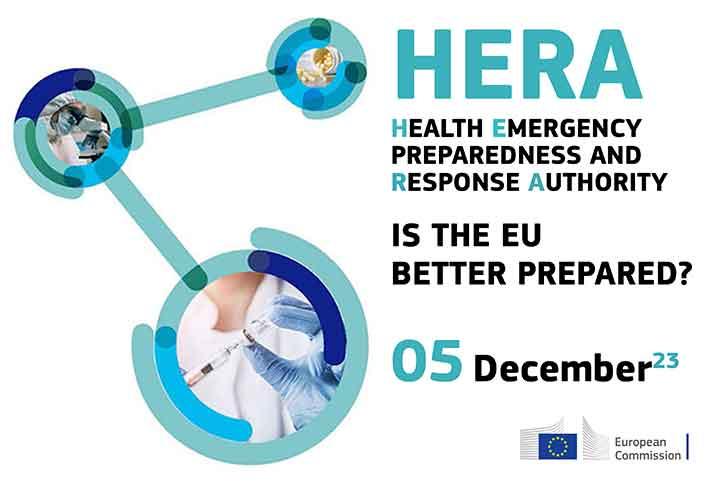
Recent health emergencies, notably the COVID-19 pandemic, have highlighted the urgent need for enhanced preparedness measures and stressed the importance of being better equipped to respond to similar challenges in the future.
Is now the EU better prepared? That was the theme of the second annual conference organised by HERA in Brussels, gathering 500 participants, in person and online. The conference brought together stakeholders from industry, academia, civil society, national, local, and regional authorities, as well as international organisations and partner countries, to ignite reflections on the topics of resilient supply of medical countermeasures, research and innovation for better preparedness, global epidemic intelligence, and the correlation between climate change and infectious outbreaks.
“At the height of the pandemic, we took a solemn vow to promise to be better prepared, to immediately respond together to another health emergency – stated Commission President Ursula von der Leyen, who welcomed everyone in a video message –. This is why two years ago HERA was created. Our cooperation is vital to keep Europeans safe against health threats and to ensure that Europe continues to be the beating heart of global biotech innovation”.
“Within two short years, HERA has become our first line of defence against emerging health threats, helping to see them coming and put in place the means to respond to them effectively, while protecting our citizens”, also stressed Commissioner Stella Kyriakides in her opening remarks.
The first morning session, which brought together HERA, the European Medicines Agency (EMA), the European Parliament, Member States and Civil Society, focused on the actions needed when it comes to availability of critical medical countermeasures, and explored strategies and policies to be implemented at the national and European levels to improve the availability and accessibility of critical medicines.
“The pandemic exposed Europe’s supply chains dependencies. With the recent medicine shortages, the Commission decided to act and put forward concrete measures – underlined Laurent Muschel, Acting Head of HERA –. By early 2024, HERA will be setting up a Critical Medicine Alliance to bring together industry, health professionals and health authorities to assess the vulnerabilities of supply chains for key critical medicines and build together solutions to strengthen them”.
The second session, moderated by Irene Norstedt, Director at the Directorate General for Research and Innovation, focused on research and innovation for better preparedness, underlining the importance of cohorts and clinical trials sites readiness in the EU, linking with the pandemic preparedness partnership, which will have an important role in setting up and maintaining ever-warm clinical trials and cohort networks.
Bill Gates spoke to the participants in a recorded message on innovation and partnerships for equitable access, stressing how over the course of its two years existence, HERA achieved numerous milestones, notably the successful establishment of valuable partnerships with leading organisations in pandemic response. Gates also stated that it is key to explore the possibilities of AI when it comes to analysing data to improve global health.
Serhii Dubrov, First Deputy Minister of the Ministry of Health of Ukraine delivered a message presenting their preparedness strategy, namely focused on chemical, biological, radiological and nuclear threats (CBRN), and mentioned their plan for strategic stockpile of medicines while also touching upon the need for enhanced cooperation. “All citizens of our country are facing challenges of risk of emergencies and of infectious diseases due to disruption of logistics and access to care – Dubrov declared –. International cooperation improves security and supply of medicines”.
The third session, animated by HERA’s Wolfgang Phillip, reflected on the critical importance of robust and agile global epidemic intelligence, focusing on preparedness for the next global health threat, the role of epidemic intelligence in the current state of preparedness, and its contribution to the development, availability and access of medical countermeasures.
The last panel of the day, moderated by Sandra Gallina, Director-General for Health and Food Safety, covered the link between climate change and health, focusing on Europe’s preparedness to respond to emerging threats stemming from climatic changes. After delivering short statements, the panellists discussed how cooperation and leadership could be translated into impactful actions, the EU’s ability to enhance its resilience to climate-related health threats, and the most important next steps at European and international levels.
“In the era of uncertainty that we are experiencing, HERA needs to emerge as an actor to safeguard our resilience and strategic autonomy. An actor that can deliver under pressure and operate as the backbone of our Health Union – stated Vice-President of the European Commission Margaritis Schinas in his closing remarks –. HERA shows emphatically a Europe that delivers, a Europe of action, a Europe of solutions”.
Background
The European Health Emergency Preparedness and Response Authority (HERA) dedicated its second annual conference to exploring the current state of health preparedness, with a focus on cross-border health threats. The conference represented an opportunity to take stock of the progress made and discuss possible avenues for improved collective preparedness.
The conference was organised in synergy with other services of the European Commission, and notably the Directorate-General for Research and Innovation for session 2. The conference also hosted an exhibition area, which saw the participation not only of numerous Commission services and agencies (HERA, RTD, HaDEA, EEA, EIB), but also of stakeholders having benefitted from EU funding.
Details
- Publication date
- 6 December 2023
- Author
- Health Emergency Preparedness and Response Authority
